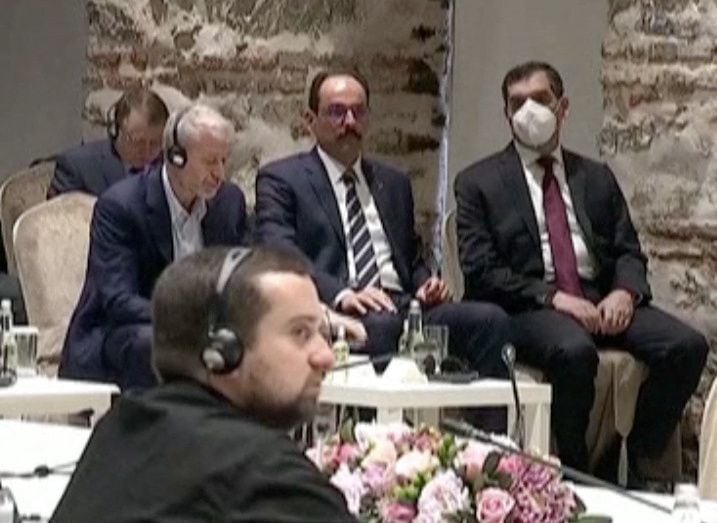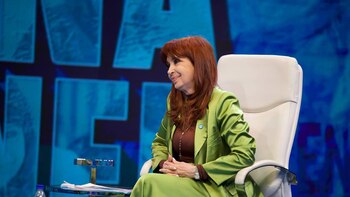
Roman Abramovich is not simply the owner of the Chelsea football club or one of the richest men in the world. Maria Konstantinovna Pevchikh, head of the research unit of the Anti-Corruption Foundation (FBK), assured that the Russian oligarch “is the reason why Putin is still in power”, amid the Russian invasion of Ukraine.
“Roman Abramovich is the most faithful and devoted of Putin's oligarchs. Their loyalties are very clear. He wholeheartedly supports everything Putin has been doing for two decades. Even now, during the war, he is at the side of the president, accepting and greeting his orders,” the Russian journalist working for the Moscow-based non-profit organization noted on her social networks, established in 2011 by political prisoner Alexei Navalny.
In addition to being part of the long list of Western-sanctioned oligarchs, Abramovich has been at the center of the scene for several days for his participation in negotiations between Russia and Ukraine. This week it became known that he suffered symptoms of possible poisoning, the same ones that affected two negotiators from Kiev. “They didn't intend to kill, it was just a warning,” reported journalist Christo Grozev, from the German portal Bellingcat.
However, Pevchikh questioned the tycoon's participation in the Russian entourage and questioned Putin's real interest: “I can't understand how it is possible to suggest that Abramovich is a good guy all of a sudden. What is it based on? Has anything changed?” Her presence at the negotiating tables “is not a good sign,” the Russian activist warned.
Even if he is in charge of denying it, the link between Abramovich and Putin is very close. The 55-year-old tycoon is part of the group of oligarchs that grew rich at the expense of the Russian state since Putin came to power. Always, under the condition of loyalty and of renouncing any political ambition. “Do what you want, make whatever money you want, but don't question my power,” was the direct order of the head of the Kremlin several years ago. And, of course, part of that income must go to the president's coffers through direct commissions or bribes.

Pevchikh even called Abramovich “Putin's last purse”, “his last source of bribes.”
In December 2010, Russian businessman Sergei Vladimirovich Kolesnikov, who has been living in exile since that year, sent a letter to then-President Dmitri Medvedev, denouncing a corrupt plot that included the construction of the “Putin Palace”. He indicated that one of the main sponsors was Abramovich, with a “donation” of $203 million. In addition, Putin's first superyacht (Olympia) was also given away by the Russian tycoon.
These stories are known because two whistleblowers dared to expose the corrupt fabric of the Putin regime. Both are now in exile.
British media say that the Russian oligarch is part of a network that would have cheated the State out of almost 3 billion dollars.
Although today he is one of the richest men on the planet, thanks to his business with the Russian regime, Abramovich does not come from a wealthy family. Quite the opposite. He went from being a poor orphan to an influential billionaire. As he once described, his is “an exclusively Russian story”.
Born in 1966, he lost his parents at the age of three and was raised by relatives in the republic of Komi, in the cold north of Russia. After a brief time in the Army, he studied engineering and his first job was as a mechanic.
At the time of Russian perestroika, he ran a children's toy factory. After the fall of the Soviet Union, the trade and transport of oil and other industrial products broke through. But the great leap to power came after a meeting with magnate Boris Berezovsky on a Caribbean cruise in December 1994.
According to a case rooted in the British justice system, Abramovich proposed to Berezovsky the creation of the large state-owned oil company Sibneft, with which he amassed a great fortune. Berezovsky, who was already rich for his business in the automotive sector, used his political connections and proposed the idea of Abramovich to then-Russian President Boris Yeltsin. The proposal was to merge a crude oil producer with a refinery, and hand over control of the business to entrepreneurs. In return, they would use the proceeds of the new oil company to finance the ORT television network to expand the Kremlin's propaganda campaign.

In this way Yeltsin created Sibneft by decree in August 1995. Abramovich was 29 years old. The company was sold to the then “modest” Russian businessman at a previously arranged auction. The sale was made for about 240 million dollars, for 90% of the shares. Abramovich used only $18.8 million of its capital. Then, in 2005, Gazprom, the huge majority-owned fuel company of the Russian state, bought its then 72% stake, paying 7.4 billion pounds.
With Putin's coming to power, Berezovsky distanced himself from the Russian president. Abramovich, on the other hand, remained loyal to the former KGB agent. In 2012 Berezovsky filed a complaint with the United Kingdom High Court of Justice, in which he gave details of the corrupt fabric of the Russian regime, involving his former partner. In the case, the Russian magnate acknowledged that the agreement for the creation of Sibneft was unlawful, and that Abramovich was aware of these actions. In the same case, according to the Guardian, Abramovich's lawyer, Jonathan Sumption, acknowledged that his defendant “was aware of this corruption, but that's how business was done in Russia in those times.”
Challenging Putin cost Berezovsky dearly. One night in March 2013 he was found dead in his mansion in Sunninghill, Berkshire.
With Putin's hand, Abramovich continued to amass his fortune with the acquisition of companies in the aluminum industry. In 2003, he sold a 25% stake in RusAl to another oligarch, Oleg Deripaska, for $1.9 billion. And he sold another 25% for $540 million.
That same year, he rose to fame when he decided to buy the English football club Chelsea for 1.5 billion pounds ($1.141 million).
The billions that Abramovich earned from Russian privatizations financed his lavish lifestyle: luxurious mansions, private jets, yachts and supercars.
The billionaire also acquired a 29% stake in Evraz, an industrial conglomerate listed on the London Stock Exchange. The company has steel production plants in Russia, the United States and Canada. Last year it recorded revenues of $14 billion.
However, the company was sanctioned following the invasion of Ukraine, because of its “close relationship for decades” with the Putin regime. The British government accused her of supplying services or goods to the Russian State, “which includes the possible supply of steel to the Russian military, which may have been used in the production of tanks.”
The company denied the allegations, stating that it “only supplies steel to the infrastructure and construction sectors.”
The European Union (EU) sanctioned Abramovich by stating that his money is intimately linked to Russia's war machine as a supplier and financier.
Keep reading:
Últimas Noticias
Debanhi Escobar: they secured the motel where she was found lifeless in a cistern
Members of the Specialized Prosecutor's Office in Nuevo León secured the Nueva Castilla Motel as part of the investigations into the case

The oldest person in the world died at the age of 119
Kane Tanaka lived in Japan. She was born six months earlier than George Orwell, the same year that the Wright brothers first flew, and Marie Curie became the first woman to win a Nobel Prize

Macabre find in CDMX: they left a body bagged and tied in a taxi
The body was left in the back seats of the car. It was covered with black bags and tied with industrial tape
The eagles of America will face Manchester City in a duel of legends. Here are the details
The top Mexican football champion will play a match with Pep Guardiola's squad in the Lone Star Cup

Why is it good to bring dogs out to know the world when they are puppies
A so-called protection against the spread of diseases threatens the integral development of dogs




